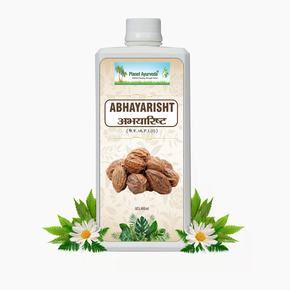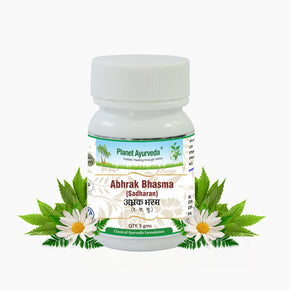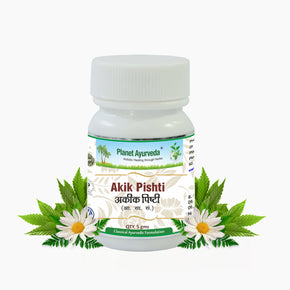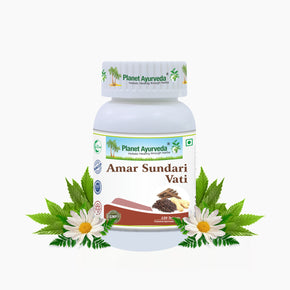- No products in the cart.
Back to products
Back to products
Next product
AKIK PISHTI - PACK OF 2 (5 GM EACH)
Rs. 720.00 Rs. 640.00
ABHRAK BHASMA (SAHASTRAPUTI)
20 reviews
Quantity: 1 gm
Dosage: 125 mg to 250 mg twice a day with different anupana (adjuvants) in different diseases or only with honey or as recommended by Physician.
Suggested Products

DIAMOND STAR HERBAL TOOTHPASTE (100GM EACH)
Rs. 88.00

SANDALWOOD SOAP
Rs. 45.00

Delivery
.png?v=1697019109)
Natural

Effects

Certified
.png?v=1697020299)
MD-Ayurveda Experts
 GUARANTEED SAFE CHECKOUT
GUARANTEED SAFE CHECKOUT

Description
Reference from Classical Texts: Rastantrasaar and Siddhaprayog Sangraha / Part 1 / Bhasam Prakaran / Page no. 75-80
- Rasayana (Rejuvenating)
- Prameha (Diabetes)
- Rajayakshma (Tuberculosis)
- Dhatu Kshaya (Tissue Loss)
- Raktapitta (Bleeding Disorders)
- Pandu (Anemia)
- Sangrahani (Chronic Diarrhea / IBS)
- Daurbalya (Weakness)
- Hriday Rog (Heart Disease)
- Arsha (Hemorrhoids / Piles)
- Amlapitta (Hyperacidity)
- Mutrakrichchhra (Urinary Obstruction)
- Veerya Stambhan (Semen Retention)
- Kamala (Jaundice)
- Unmad (Insanity / Mania)
- Vran (Ulcers / Wounds)
- Shwasa Roga (Asthma / Chronic Cough)
- Vataroga (Rheumatic / Neurological Disorders)
Abhrak Bhasma (Sahastraputi) is a renowned Ayurvedic formulation prepared through an intricate process involving the repeated incineration of purified mica as many as one thousand times, hence the term "Sahastraputi." This extensive purification and processing make it highly potent and bioavailable. It is considered a powerful maha-rasayana (supreme rejuvenator) in Ayurveda, known for protecting the body from Akal Mrityu (untimely or premature death).
Abhrak bhasma is one of the classical formulations that helps in implying the use of calcined mica ash. Being one of the powerful Rasyan dravya, Abhrak bhasma is not only capable of providing adequate energy to do specific activities but also has a calming effect on the body as well as the mind.
Contraindications
If taken without any prescription from the doctor and in excessive form, it can result in acute bleeding or increased heart rate. It is strictly suggested to avoid the use of this bhasma for pregnant or lactating mothers.
- Keep away from children
- Avoided in lactation and pregnancy
- Store it in a cool and dry place
- Can be taken under expert's supervision
This is pure classical Ayurvedic medicine and should be strictly consumed only after prescription of an Ayurvedic doctor and to be taken under medical supervision only.
Ingredients
KEY INGREDIENTS
- Abhrak (Mica)
- Ark dugdha (Calotropis gigantea)
Reference:Ayurveda Saar Sangrah
Talk to our Experts
Our trusted experts can help you choose the right products for your health.
Book Your Consultation Now
Our Company Certifications

.png?v=1700656791)


























.png?v=1695813493)






















